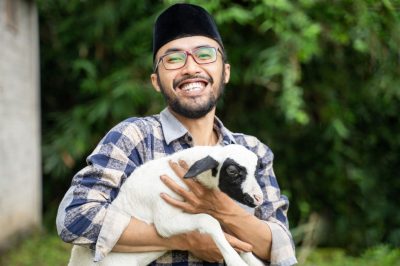What is the right age for children to watch this?If it happened that children saw the scene of slaughtering the Uduheya and were frustrated, what can parents do to solve this?
Answer
In this counseling answer:
•I would assess your child’s knowledge of Eid Al-Adha, experiences with hearing or glimpsing previous sacrifices as well as discussing with them how they may respond emotionally.
•This is also a good time to discuss the history and significance Eid-Al-Adha, and the importance of obedience to Allah SWT.
•You may also use this time to illustrate the kind treatment of animals (halal sacrifice), the importance of charity, as well as helping them develop a healthy understanding of the processes of life and death.
As-salamu alaykum,
Concerning children being present at the slaughtering of an animal for Eid-Al-Adha, it depends on the child, the family, and the community in which the child is being raised.
In many western countries, children who live on farms and tend to the farm animals learn from a very early age on that this is the course of life. You raise animals and when the time comes, they are slaughtered for food.
Children Watch Animal Slaughtering
In Islamic countries children have similar experiences as our Eid celebration is a festivity with which they grew up with and are accustomed to.
While I am not an Islamic scholar, I cannot give you a set age, however from a psychological perspective, I would assess your child’s knowledge of
Eid Al-Adha, experiences with hearing or glimpsing previous sacrifices as well as discussing with them how they may respond emotionally.
Educate them about Eid-Al-Adha
This is also a good time to discuss the history and significance Eid-Al-Adha, and the importance of obedience to Allah SWT.
You may also use this time to illustrate kind treatment of animals (halal sacrifice), the importance of charity, as well as helping them develop a healthy understanding of the processes of life and death.
You may want to talk with the child about it insha’Allah and see how they feel. I would never force any child to watch the sacrifice, but would let the child decide.
Check out this counseling video
The child may want to watch for a few seconds and leave, that is fine. The child may need time to develop cognitive and emotional abilities to watch a sacrifice by taking small steps.
Other children attend the sacrifice as a collective thus making the experience a group process in which a teacher or parents can discuss the event with the children as a whole.
Conclusion
In this way, the children help each other develop a deeper understanding by sharing their feelings and perceived experiences of what is going to happened and after, what did happen.
If a child was previously traumatized by viewing a sacrifice, the child should have an opportunity to discuss what he or she perceived, how they felt, and Islamic support and understanding should be given.
Children should never be forced, but should be taught at age appropriate levels, that this is a natural cycle of life and that sacrificing an animal for Edi Al-Adha is obedience to Allah SWT.
Salam,
***
Disclaimer: The conceptualization and recommendations stated in this response are very general and purely based on the limited information provided in the question. In no event shall AboutIslam, its counselors or employees be held liable for any damages that may arise from your decision in the use of our services.

